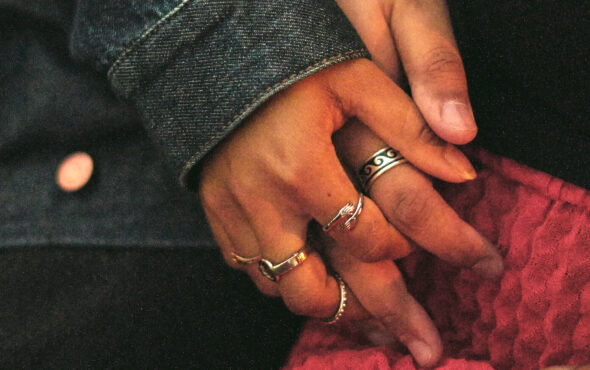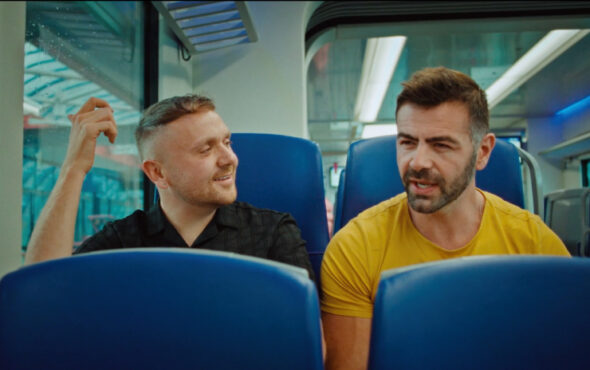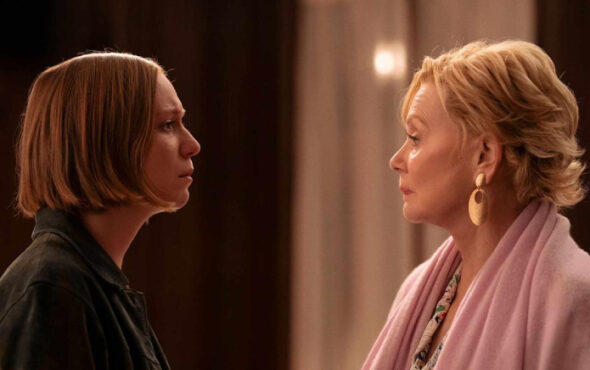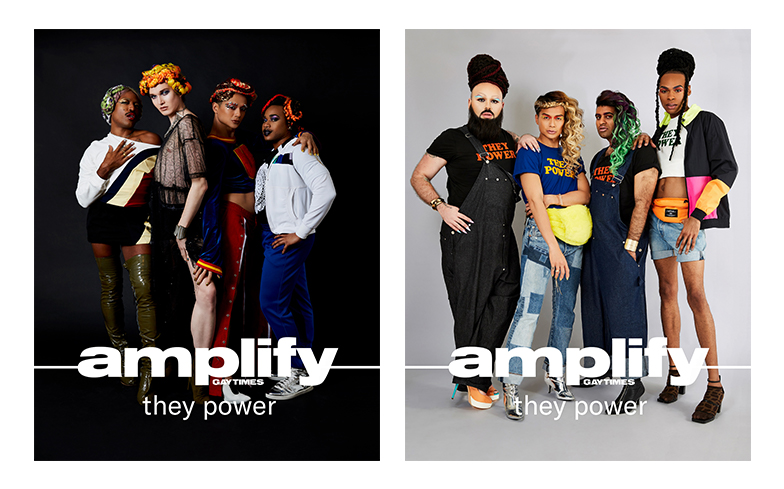
I’m sat in my, what I call, ‘London Office’, which is actually just a coffee shop that I’ve called home for the past six months staring at this page and just not knowing where to begin. And as a writer, that’s bizarre.
I even took myself off to Tate Britain for a gloriously camp ‘emotional stroll in the rain’ to try and recalibrate my brain, but I still couldn’t begin. I can’t really tell you why either. I write about being non-binary all the time and it’s the first thing that my talons on the end of my fingers go to do when I open my laptop. Maybe it’s because this is a moment for me and so many other people. My first digital cover interview for a publication that I used to flick through in my small town but was too scared to actually buy. It’s one of the first times that I’ve seen a group of powerful, femme, non-binary people celebrated in a way that isn’t just appropriating their looks in the sake of an editorial orgasm. A platform and community that is truly allowing gender non-conforming people to be the stars, and tell their own stories.
For so long, we’ve been the topic of debate. The sensationalist story that graces the covers of some of the world’s biggest tabloids. ‘Trans Kids are on the rise’ chimes one, another pops off with jargon about trans women encroaching on ‘women’s only spaces’. Meanwhile, we are sat at home, living our best lives, realising our cups of tea have gone lukewarm, and forgetting to hang the washing out. Being human. Being everyday. Being ourselves. Our narrative has been painted by brushes that aren’t just tarred, they’re no longer brushes, but this doesn’t stop them creating masterpieces that paint us into the enemy and something to be feared – much to the mainstream press’ applause. And as the trans and gender non-conforming community step out of their front door, and go about their day, they’re greeted with the after-affects of these lies. We are expected to answer to it. The behaviour towards us is legitimised by these stories, and it worries me how this isn’t something that these so called ‘award-winning’ journalists realise.
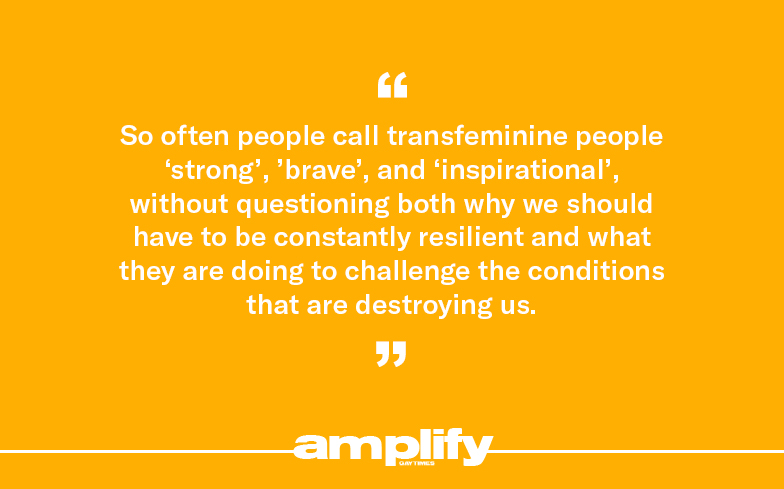
For me specifically, I am constantly so hard on myself – and in the most Bradshaw-esque way possible. I can’t help but wonder if this is because society’s judgements on my being and my body have made me that way. So many of us in the non-binary community hold ourselves up to such high standards because of the ways we are taught to exist in the world. But we are enough in all that we do. Our work, our love lives, our aimless wandering down Oxford Street. Our identities are valid, no matter how they are expressed. We are enough. We are not here to just be tolerated and smiled at. We are here to be respected and revered. To be in positions of power and to be listened to in all that we do. To have our pronouns respected and not just treated as an afterthought. We aren’t new here, we have existed for centuries, and the colonisation of our identity has meant that trans and gender non-conforming people – specifically people of colour – are suddenly seen as an entity that has never been seen before. Little do they know of our rich, beautiful and ethereal history.
Speaking as yourself and for yourself is one of the most powerful things, as human beings, that we can do, and after years of being spoken for, the seven people adorning this cover and the subsequent interviews mark a turning point for the conversations around our identities. These people don’t only speak their truths, but they live them. Through their respective careers and work, they have dedicated themselves to forging a path through the turbulence, to create such beautiful and aspirational lives. Not only are our struggles universal, but our success and achievement is also just that. It gives me pure unadulterated joy to be able to share stories of power, poise and strength from these amazing people. It’s rare that we get to control our own narrative, and for the whole project, from the shoot to the interviews, to be created and formed by gender non-conforming and non-binary people, it’s a strong statement to the masses as to how we should be discussed and profiled.
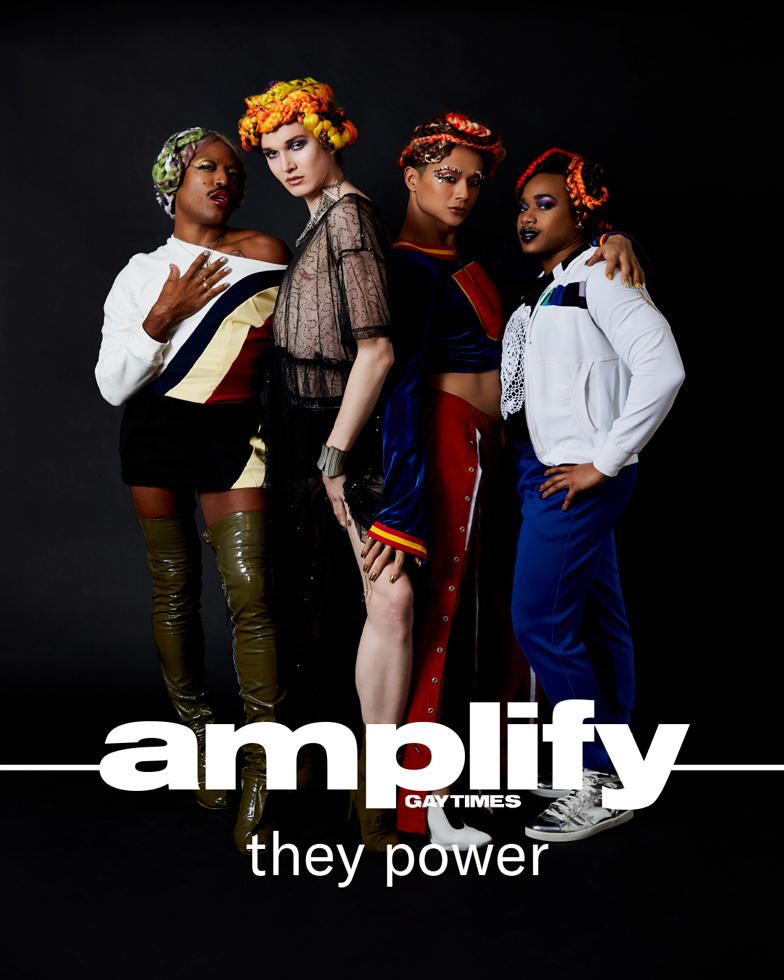
Something I have encountered as I stepped off the education train has been the pure lack of intelligence outlets have towards us. Me. You. All of the LGBTQ community, but especially trans and gender non-conforming people, and even more-so trans and gender non-conforming people of colour. Our stories fit for a few weeks of the year, but apart from that, we are not the conversation that they need to be having, or the minority that they want to take pity on. My career is only just beginning, but even I knew from day one that we have to be the people who set our own barometers of success. We can only see our own struggles and barriers, and only we know how to overcome them. Our spirit is so strong that we become our own bosses. Our own business owners. Our own CEO’s. Our own idols – and that’s so important when it comes to living as your truest self in this world as a gender non-conforming person. We’ve had enough of the empty dreams and ‘this isn’t right for us at the moment’ replies. We are the ones that have, for a very long time, held the tools that can propel us to our own success, and it’s time we stopped waiting for cis people to give us the green light, and walk over them to the finish line to create our own beautiful vision of what we want the world to be.
Alok Vaid Menon.
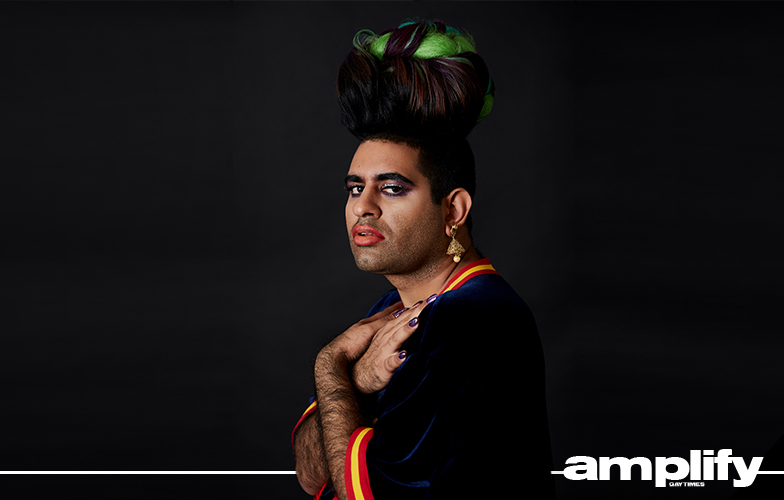
JW: For gender non-conforming (GNC) people our aesthetic and gender expression is super important for us and our existence. What tips would you give someone who wants to explore their femininity in a safe but carefree way?
A: Gender expression is relational: often times it takes affirmation from other people to help femifest ourselves. There is no way I could be the person I am today if it wasn’t for other people rooting for me and being there to process the grief of harassment. Both friendship and performance have been some of the few spaces where I was encouraged and supported to experiment with my gender. So I would suggest exploring around people close to you who do not couple your appearance with your worth.
JW: How do you find the response to your work when you’re performing in India compared to NYC and throughout the US?
A: Certainly geographical and cultural context has bearing on reception, but I actually find that each audience (even within the same city or country) is enormously different from one another. The nature of my work is visceral and it depends on the energy in the room – a willingness to be vulnerable and encounter contradiction. So often times it’s about what people are going through in that given day – their heartbreaks, their loneliness, their fear – and that really sets the tone and shifts the mood more than anything. That being said, I have to say that the UK is one of the most difficult places I perform. The emotional repression: unparalleled.
JW: I remember working with you last year and your words really stuck with me when you spoke about the hypocrisy of self-care and who actually needs to be doing the work to prevent us from having to constantly have to come up with coping mechanisms. Can you explain this further?
A:So often people call transfeminine people ‘strong’, ’brave’, and ‘inspirational’, without questioning both why we should have to be constantly resilient and what they are doing to challenge the conditions that are destroying us. The onus is always put on the person enduring the crisis to somehow selfie/love their way out of it, rather than on other people to just stop our plight. I want another way of relating where we are doing reciprocal care work for each other, one in which we are figuring out more kind and interdependent ways of coexisting, recognising that mental and physical wellness aren’t individual shortcomings, but rather collective concerns.
What are your goals for 2019 for you and the trans/GNC community?
A:Ambition beyond recognition. Defy easily consumable narratives. Be gnarly and ruthlessly indigestible. Be myself even when it hurts, especially when it hurts. Recognise that there are many ways to be as there are people in the world, and that is our strength. Most of all: demand a total and fundamental rethinking and undoing of the gender binary.
B. Hawk Snipes.
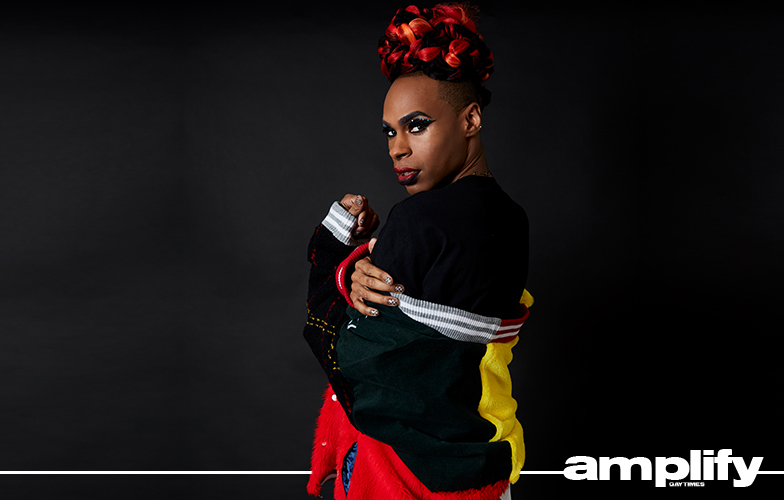
JW: POSE is now a Golden Globe nominated TV Show which is a true testament to the power it had on our screens. What lasting message or feeling did working on it leave you with?
B:Working on the TV show POSE has probably been one of my biggest accomplishments thus far, and not just for my entertainment resume but also for my state of mind. I struggled with owning my feminine energy emotionally and questioned if I was non-binary or GNC. It wasn’t until the show aired and I saw the amount of love from another GNC and non-binary people that I knew from listening to their words of encouragement and experiences that I identified more as non-binary.
JW: We are both signed models and have our heels firmly in the fashion scene. How do you deal with the fashion industry’s usage of trans and GNC identities as a trend?
B: I see it as a curse and a blessing honestly. I don’t like participating in anything that’s ‘trendy’, but I know that trends make money for the industry and I like getting opportunities to represent for other people like me.
JW: Pronouns are something that a lot of GNC/non-Binary struggle with in terms of getting people to adopt their usage. What’s your experience of this?
B: Pronouns for me have been very challenging because for a long time my brain was programmed to know only him and her. Growing up in the Bronx in New York, I didn’t know anything else in between so it took me a while to own both of my masculine and feminine energies and use they/them pronouns.
JW: What are your goals for 2019 for you and the community?
B: My personal goals are to create more opportunities for myself and my community. I’m working on a TV talk show, a short film and more music. But I really want people in the LGBTQ community and our allies to come together to really do more work. We have to support each other more now than ever because most of the cis heterosexual white men that are in power don’t care about us. And that’s not shade, it’s just a fact.
Dee Trannybear.
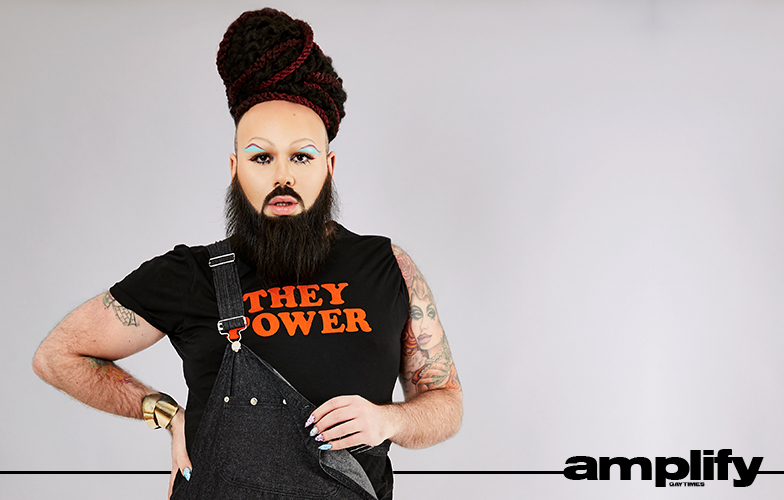
JW: Your creations – let’s just call it what it is – ART, truly express GNC beauty. How does it make you feel to transform people into their truest selves?
D: I love to bring out people’s true colours! Living in your true self to me, is very important. It gives you a feeling of empowerment, freedom and happiness to your spirit and soul. When a human being is feeling forced to portray themselves as something they’re not, it’s mentally challenging and will hold that person back. Just because my gender non-conforming and trans community likes to express themselves a little more fierce and fabulous than binary people, it shouldn’t give people the right to force us into certain societal boxes, that were created by colonizers that had no idea about the world and human beings. That’s why I love breaking barriers with my work.
JW: As the co-founder of your own production company that’s worked with some amazing clients, how does it feel to be infiltrating non-queer spaces when creating your artistry?
D: It depends, sometimes it’s pure objectification, people don’t view me as human, they see me as a thing, because of me (a hairstylist, artist and personality) being lightly painted, in a six-inch wedge heel and a beard. What they don’t understand is that that is what challenges me, inspires me and motivates me to create my best work! I love to educate in situations like that, even though that can be creatively stifling to always have to explain yourself. Then there are instances where non-queer places show compassion and open mindedness and that always gives me hope to change is coming.
JW: What piece of advice would you give to the players in your industry who don’t appreciate the beauty of queer GNC beauty?
D: Well I’m going to be frank here… GNC and trans people have been around for thousands of years influencing styles, trends and people. So many times cis people that want to hate on our creativity and freedom, copy and pull inspiration from our creations and don’t credit us or deny that’s where they got it from. My message to everyone is this: we were, are and will always be here, creating and evolving, no matter how many times they try to beat us down. We will keep striving and inspiring for centuries to come. We know how to persist. Together we are stronger.
JW: What are your goals for 2019 for you and the trans/GNC community?
D: I’m calling 2019 ‘the year of the uncomfortable conversation’ because time is up. Humanity is in desperate need of a do over! We have to dismantle white supremacy, racism, transphobia and homophobia as well as misogyny, rape culture, global warming and many more issues that are threatening our planet. It’s time for GNC and trans people to be in positions of power, getting equal opportunities and recognition. We are talented, passionate, out of the box thinkers that make the world a better place. Hate is taught and it’s time to break that circle. That’s why we are so proud that Deja and I – transgender and GNC hair and makeup duo, DDPro) – produced this cover shoot story to show what They Power really means and empowers future generations to live freely as their true selves, while always remembering and honouring the ones that paved the way for us.
Devin-Norelle.
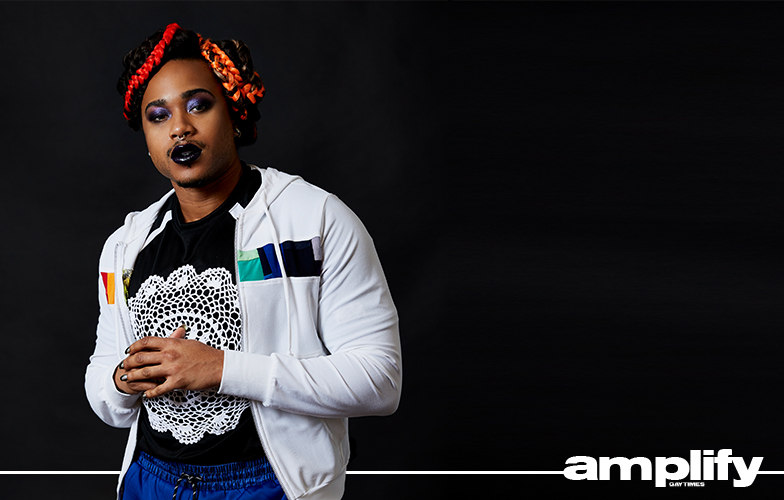
JW: Across both the UK and US media, trans and non-binary people are misrepresented and spoken for instead of allowed to speak. How can media outlets get it right, or do you think LGBTQ specific sites should just continue to own that territory?
D: I believe moving forward, we can have both. LGBTQ specific sites are crucial for starting the conversation and leading by example. Yet, at the same time, we need to normalise reporting LGBTQ narratives on non-queer sites. We could achieve this if hiring LGBTQ people in media was standard. I’m not implying we should fulfill a quota. Imagine if LGBTQ people made up half the workforce because we didn’t take issue with their queerness. We’d make fewer mistakes in our reporting of queer people, spend less time apologising for misgendering folks, and even display some form of empathy in our journalism. We have several LGBTQ sites as our resources. We have thousands of qualified queer journalists waiting to be hired. What are we waiting for? This could be our watershed moment.
JW: You’ve spoken about TERFS on your socials last year and their ridiculous views – how do you think trans/GNC people like us should combat that level of non-inclusive feminism?
D: We should continue producing literature and creating spaces where we put into practice that which we preach. Intersectionality is a difficult concept for so many others to grasp; when holding space, others can learn by observing. I also believe many people are unknowingly TERFs. A couple years ago, Chimamanda Ngozi Adichie expressed her belief that trans women and women were not one in the same. When it was brought to her attention that this opinion was transphobic and that she was wrong, she denied that it could have been transphobic and, instead, doubled down on her belief. It’s disheartening to witness one of your idols, a champion of feminism, invalidate trans women. Consequently, I began to ponder if someone so informed, like Adichie, lacked exposure to trans people. Calling out ignorance can be effective, but perhaps we should also consider producing more narratives that could truly paint the richness of the trans community. Adichie’s grouping together of all trans women and their experiences really speaks volumes about what specific trans narratives are disseminated and praised by mainstream media. Trans women are not a monolith. If stories about trans women who were raised as women circulated as widely as stories about women who transitioned in adulthood, perhaps Adichie, and people who shared her beliefs, would recognise that trans women are women. Furthermore, this information could be better distributed if we hire more LGBTQ people in journalism, as previously mentioned.
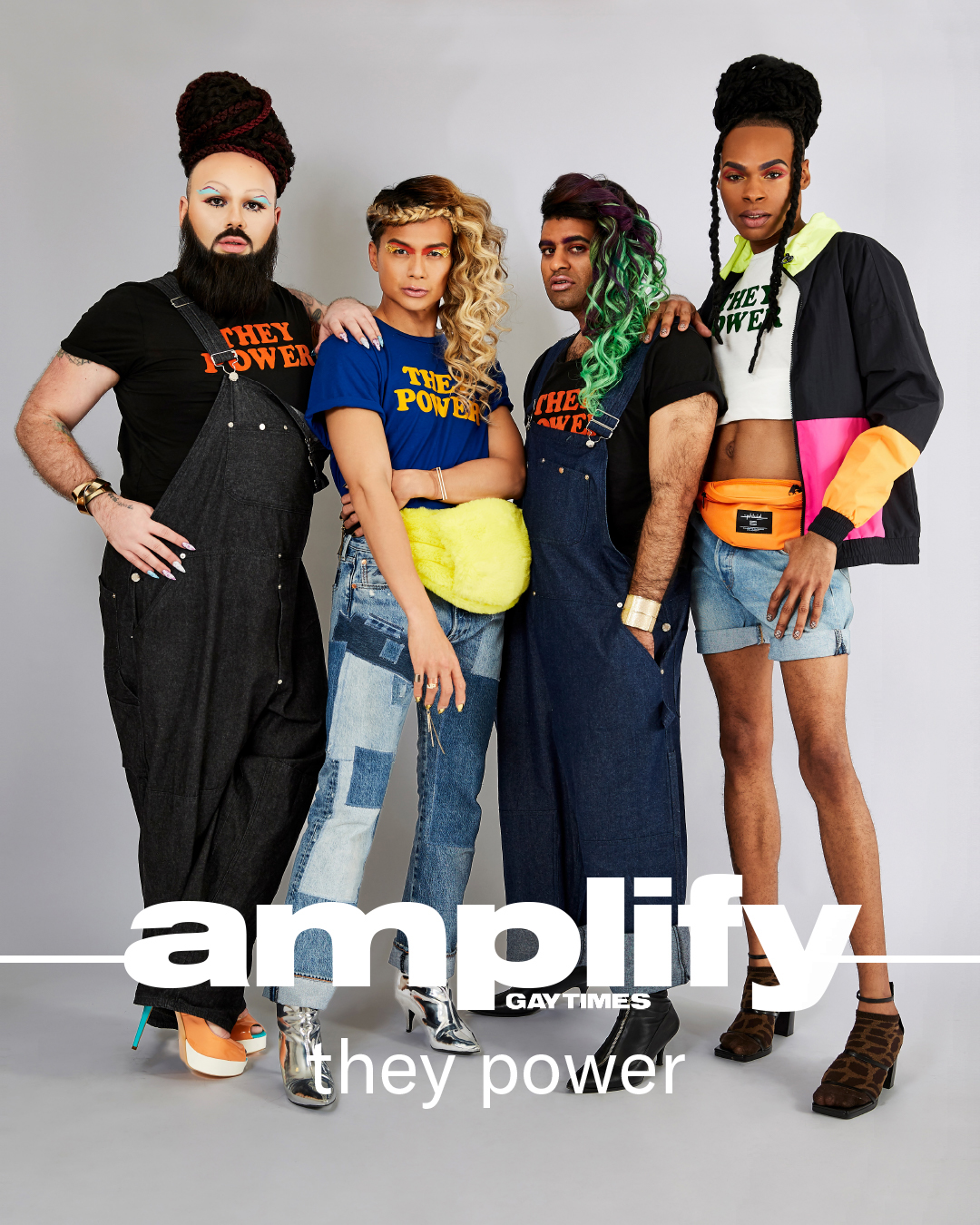
JW: What advice would you give to someone who wants to tell the people in their immediate circle that they want to use pronouns such as ze/zim?
D: Explaining to family and friends that you use gender neutral pronouns can be rather daunting. I remember when I approached my friends about wanting them to use ze/zim, they were a bit confused at first. Many were not aware of gender neutral pronouns. I came prepared. I printed out a list of all known pronouns and presented it to them. I described a short of history of gender neutral identities, explaining how the binary was introduced to our ancestors via imperialism. We discussed what it was like for me to medically transition as a means of moving away from something and not necessarily towards anything else. I expressed how I felt my pronouns should reflect this action of moving away. The print out really helped; having a visual and reading about all the other pronouns really piqued their curiosity while also encouraging further discussions. To the newbie, I would suggest coming prepared by having materials for people to read, explaining to them why those pronouns complement you, and moreover, emphasising that using the correct pronouns is a validating experience. In my experience, people will still make mistakes. If it happens often, challenge the person to use only your name when referring to you. You’ll be forced to be a little bit more creative when discussing someone in sentence structures. Omitting pronouns, and then re-introducing them again at a later time eases the process of using pronouns you might not be accustomed to.
JW: What are your goals for 2019 for you and the community?
D:Liberating my community. Uncovering all the hidden narratives about our existence and history. Magnifying narratives not commonly celebrated. Being an example that love and acceptance comes from within, and encouraging others to seek only ourselves for validation of our identities. I believe our community can move forward when we begin to comprehend that non-binary people are also the standard, and reject any systems reinforcing conformity to one archetype. More personally, I’m excited to finally change the gender marker on my birth certificate to X (thank you, New York), and subsequently using this document to change the marker on my state issued ID as well. I’m looking forward to seeing more opportunities for trans people in fashion, media, and Hollywood, and hope to be one of those folks carving space for us in those industries.
Jeffrey C. Williams.
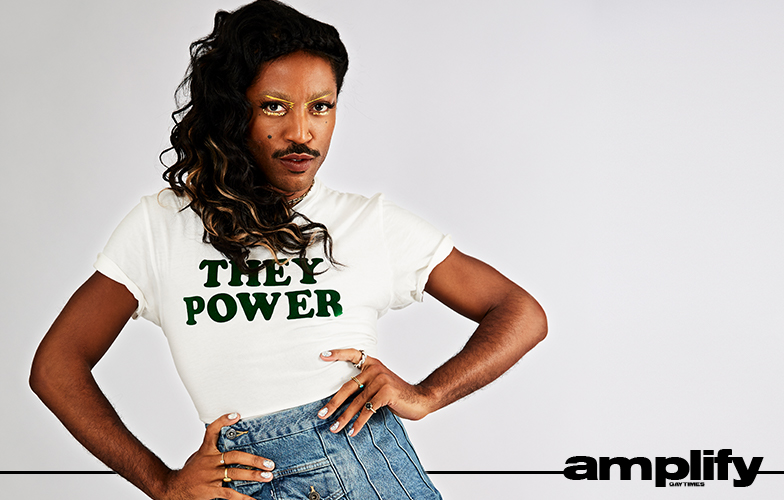
JW: Your designs and creations really have that unique and bespoke feel. How much did your gender identity and expression come into play when designing these pieces?
J:When designing shoes, clothing, handbags and other pieces for my lifestyle company (jeffreycwilliams.com), my designs reflect my gender fluidity, personal history, emotions, and how I want to be seen in the world. It takes lots of confidence, vulnerability, gentleness, and courage to be one of us. I like my pieces to reflect that uniqueness. There’s also a constant thread of my feminine and masculine energy woven through my designs. A sense of balance and unbalance at times.
JW: New York has just legally recognised the third gender identifier that is now available on birth certificates, which is amazing. How does it feel to live in NYC with its progressive laws, as with all major cities, transphobia and discrimination still occurs on the streets and in public spaces?
J: I think this is absolutely incredible! It makes my heart smile to see equality laws being passed. What a celebration! I think about the people who fought against these inequalities before us and the shoulders we stand on. It is important to still fight, to fill spaces, to be seen, to be heard, and celebrated for our naturalness.
JW: What advice would you give to someone who wants to break into the fashion industry but is worried that their identity, race or ability could hold them back?
J: I would say to emerging talent who want to get in to the fashion industry to just do it and do it every day. Don’t let what naturally makes you special hold you back whether it be your sexual identity, race, abilities, etc. It’s important to not listen to everyone because we’re all still learning. Only you secretly know what’s best for you!
JW: What are your goals for 2019 for you and the trans/GNC community?
J:My goal is to be an example of unconditional love, practice compassion, to be an authentic voice, and to always leave room to grow in our and with our community.
Jeremy Moineau.
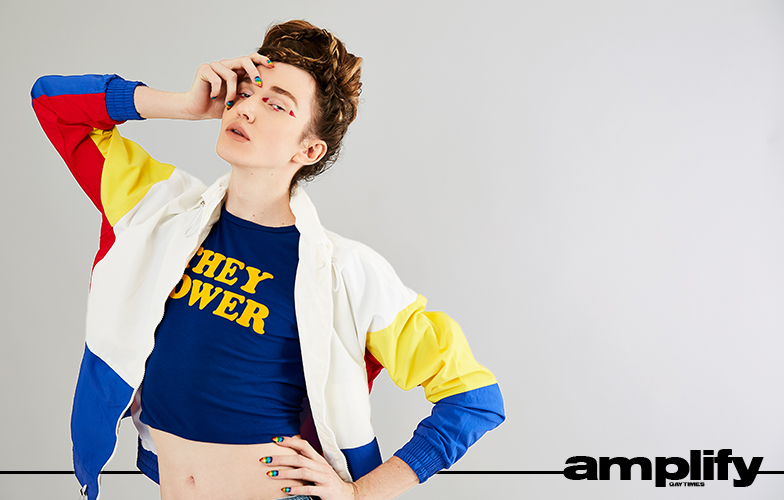
JW: How do you find working as a dancer intersects with your identity? To me, I love it. The freedom and fluidity in both your identity and the dancing that you do seems like a perfect combination.
J: Being a dancer is like viewing the world through another lens and experiencing everything in a much more intense way. You start to hear the rhythm in a car engine the same as you would hear the beat under a music track, things like that. My background in dance also helped me understand gender fluidity because so much of what we do as dancers is fluid and experimental and very much about discovery of self.
JW: Your social media is a true curation of beautiful content, structured in such an effortless way. What power does social media have for you when it comes to being able to interact with your trans/GNC siblings?
J: Thank you so much! I’m sure that we’ve all heard about the pros and cons of social media, but one of my biggest pro take aways is definitely being able to be visible and available to others in my tribe while also interacting with people I may not normally have a chance to. One of my favourite sayings is, ‘If you don’t show, they don’t know’, which basically means that if you don’t shine a light on your talents and individuality, it will never be seen or recognised. You might be able to do a great backflip, but unless I’ve seen it, I’m going to continue through life not knowing that you have that inside you. Social media helps in bringing those talents to the front.
JW: What challenges have you faced within the dancing community when it comes to traditional and ‘rigid’ concepts of male and female dancing roles?
J: When I was going through dance school there were most definitely two defined gender roles, the male and the female. It’s difficult, because as much as dance is an art form, there are also bills to be paid, so if you dance within the lines of those binaries, you have more of a chance of cutting those checks. Sad, but true. However, there’s a lot of great artists out here helping that change in a big way, for example Chase Johnsey in the English National Ballet.
JW: What are your goals for 2019 for you and the trans/GNC community?
J: My personal goals are to continue modelling and dancing, find ways to cut back on sugar – believe me, it’s really hard in the US – and y’know, fall in love or like whatever. For my community: I’m going to try to volunteer more with LGBTQ youth, especially those on the non-binary spectrum. I really want to support and highlight more gay, trans, POC brothers and sisters in the entertainment industry in lead roles, and I’m also going to start focusing my energy to a calculated plan to work towards protecting and fighting for the rights of my community. I think that I, like a lot of people, have been really reactionary in regards to political change and all of the attacks coming out of DC. But it’s time to actually focus and think about what we want as a community and to start making demands, rather than just trying to keep clearing the grenades that are thrown into our camp. If we wait for those at our opposition to outline how we have to exist and then negotiate and fight for equality from there, it’s a harder fight to win. I’d rather call the shots. We have more power collectively than everyone even knows.
JP Moraga.
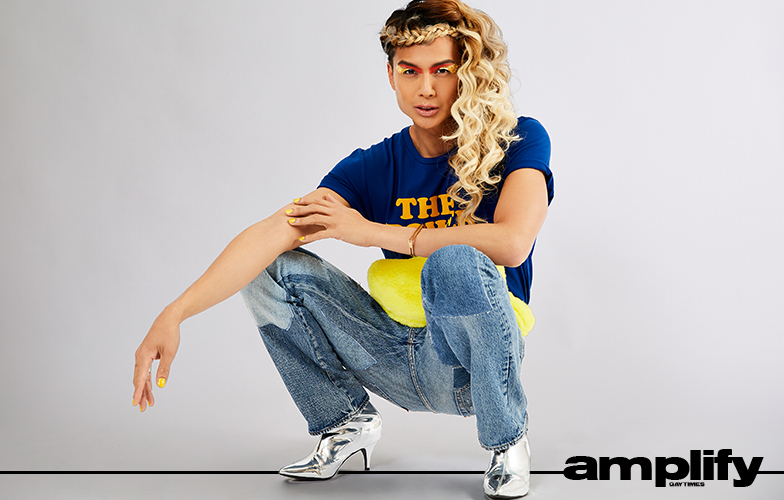
JW: As an actor, what are your views on cis/heterosexual actors playing trans/queer roles in hollywood?
JP: As a Filipino-American actor, there’s so much privilege within the cis/heterosexual/white world. We are now in a time where there is more LGBTQ talent in the pool. There shouldn’t be any more excuses in every department in Hollywood. Now is the time of giving chances to us who identify as trans or queer.
JW: What’s your favourite thing about living and thriving in New York City as someone who is gender non-conforming?
JP: I love living up my freedom no matter where I am in the city and the ability to express myself. I love seeing more and more of my fellow gender non-conforming tribe roaming the city with pride, power, and not giving a single care on what looks they are giving.
JW: How do you ensure that your personal self and identity don’t get compromised when you’re working?
JP: It’s always a battle, but the more I seek my truth the more I steer away from a form of assimilation that requires me to survive in the binary world. Opportunities have been coming left and right as I live my truth and tell my Filipino-American queer story.
JW: What are your goals for 2019 for you and the trans/GNC community?
JP: My goal is to change the beauty standards within binary roles, and to also represent the Filipino-American/Queer/Gender non-conforming community on a big platform, and free people from concern through my visibility in my art.
A new regular digital cover story from Gay Times, Amplify gives you the immediate inside access to the big conversations in our community.
Click here to buy the new issue of Gay Times Magazine
Photography Lauren Perlstein
Words Jamie Windust
Conceptualised and produced by DDPRO
Stylist Preston Souza using all fashion from The Phluid Project
Manicurist Naomi Yasuda
Hair Dee Trannybear
Hair Assistant M Alsondo
Makeup Deja Smith
Makeup Assistant Nicole Lyba
Assistant Paris Buford
Makeup Assistant Carlo Tomlin

